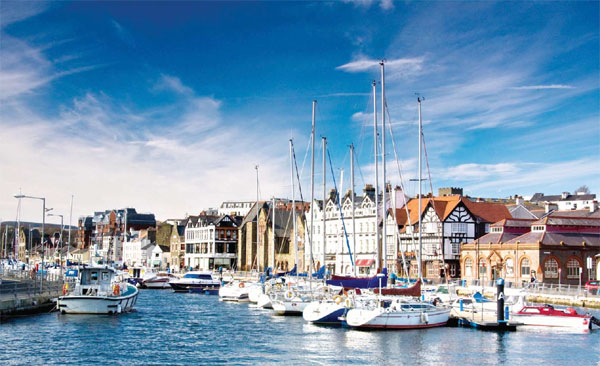Small island makes a big difference
Updated: 2016-02-26 08:56
By Cecily Liu(China Daily Europe)
|
|||||||||
|
|
Business is growing for Isle of Man as China avails itself of the British dependency's location and expertise in financial and other sectors
The Isle of Man is undergoing a transformation from its former image as a sleepy tax haven to a business center championing industries such as financial services, information technology and manufacturing.
And China is becoming a key partner.
The island's government decided to prioritize China as a top trading and investment partner a few years ago, and since then many delegations have visited the country. Isle of Man representative offices have been set up there to promote a wide range of opportunities.
The self-governing British Crown dependency, located in the Irish Sea between Britain and Ireland, has a population of about 85,000, and includes the main island and several small islands nearby. It has one of the world's highest standards of living, as its GDP per capita, measured by purchasing power parity in 2010, was $53,800.
One Chinese company that expanded into the Isle of Man last year is Shanghai-based Gush Multimedia Arts, which intends to use the island as a base to sell its virtual cinema technology in Europe.
The company's 3-D live-action film technology was used in the private entertainment sector for the first time at the 2015 Milan Expo. The company is set to launch it across Europe, using the offshore British tax haven as a production site.
The technology allows real actors and virtual actors to appear together as in a live performance. Only one or two real actors are required - the rest of the cast, and setting and props, are virtual.
Zhao Yunfeng, president of Gush, made his first visit to the Isle of Man about three years ago.
"I visited several film production companies and was very impressed. They had good infrastructure, lots of professional workers, and we made a calculation of how much production would cost compared with other European locations and realized it's much cheaper," he says.
The Isle of Man has a strong film production sector because of its natural scenery, says Zhao, but it has weakened with international filmmakers having more location choices. Countries such as Australia and China are becoming more competitive, and an increasing number of outdoors scenes are filmed there, he says.
"So when I visited the Isle of Man, I realized it is not in its boom time anymore, but the facilities and skills are still excellent, so I decided it would be a good idea to set up a subsidiary and make the most of the country's facilities," Zhao adds.
Gush's investment is happening as the island is experiencing great economic growth. Three decades ago, GDP per capita in the Isle of Man was half of that of the UK, but now it is 240 percent the UK's figure.
The growth mainly occurred because the Isle of Man has changed from relying on tourism to championing new ideas and innovation. The new business culture encouraged risk-taking businesses.
The key sector now is financial services, including banking and insurance, which account for a third of GDP, but the island has a diversified economy and sectors like information technology and high-tech manufacturing are also crucial.
Other Chinese companies have come to the Isle of Man with a vision of growing in Europe. Many are trading companies that manufacture in China and sell in Europe, using their island subsidiary as a European marketing office.
Steven Beevers, head of special projects at the Isle of Man's Department of Economic Development, says the island has increased its efforts to attract Chinese companies in the past three years, establishing representative offices in Shanghai, Beijing and Shenzhen.
"Traditionally, Chinese manufacturers would sell through European trading companies that act as intermediaries, because they didn't know the European market very well. But increasingly, they realize the intermediaries have profit margins that are too big, and they are now trying to export by themselves. We have started to help them," Beevers says.
Cooperation between China and the Isle of Man in financial services is just starting, but many opportunities exist, says John Spellman, director of financial services at the economic development office.
The two complement each other, he says, given that the Isle of Man is known for financial services and China's financial services industry is growing and changing due to its economic structural shift.
In the insurance industry, the two governments signed a cooperation agreement last year.
Spellman says Chinese manufacturing firms can set up "captive" insurance services for themselves on the Isle of Man by utilizing the island's expertise. Captive insurance is when a company establishes its own insurance to lower its risks, in this case risks associated with the warranties of its products.
Chinese firms also can set up operations on the Isle of Man and use it as a base to invest in overseas assets, diversifying investments.
In addition, Chinese firms can create insurance products targeting overseas Chinese, and use the Isle of Man as a sales base. These products would be created with an understanding of Chinese culture, and sold using familiar Chinese brands.
Another area Spellman's staff is working to encourage is the clearance of Chinese exports to Europe, now that the Isle of Man government has invested in an entry processing unit for imports and exports. The unit, including computer systems and operators, "allows importers, exporters and freight forwarders to complete customs information electronically, and automatically checks for entry errors", according to a UK government website on customs.
It determines which goods or documents need to be physically examined, which "gives legitimate goods, and those deemed to be a low-level risk, faster passage", the site says, cutting delays and costs.
Increasingly, Chinese companies and individuals are making use of the island's expertise in fiduciary services.
Chris Eaton, chief executive of ILS World, a fiduciary services group based in the Isle of Man, says his company started to expand into China a decade ago, initially establishing an office in Hong Kong and later in Shanghai.
It has about 500 clients in China, most using basic services, but in recent years Eaton has seen an increasing number of Chinese clients turn to its more complex services, which include two main types.
The first involves structuring an offshore subsidiary on the Isle of Man, so a Chinese company's exports to Europe won't need to pay tax on profits. This is done by having the headquarters sell the products to the subsidiary, then using the subsidiary to sell to Europe.
This type of service is becoming increasingly popular because more Chinese companies are seeing their export margins trimmed by international trading companies.
Under the traditional model, the Chinese companies would receive only 20 percent of the ultimate value of the goods, whereas if they do the selling themselves they receive about 60 percent, Eaton says.
The second is to set up an offshore trust that holds assets of Chinese individuals, such as property, bonds and stocks. This is good for the wealthy who wish to allow their offspring to have use of their offshore assets without incurring inheritance tax liabilities.
They might put property into an Isle of Man trust and name their son or daughter as the legal user of the property for the long term. The fiduciary services provider looks after the trust for them. It is also preferable to directly handing the property to offspring because the owner has more control over when and how it is passed down.
Eaton says traditionally, many services for the Chinese market tended to be simply creating offshore structures to hold wealth, but these structures are not by themselves income-creating. New and more complex services reflect the growing sophistication of Chinese clients.
Despite such cooperation still being relatively new, the government is putting strong emphasis on growing its relationship with China, says Allan Bell, the Isle of Man's chief minister. Bell has visited China twice to meet with Chinese leaders and executives. He has visited Beijing, Tianjin, Shanghai and Wuxi.
"The Chinese people are friendly and helpful, and we've done our best to learn about Chinese culture. The Chinese people are full of energy, dynamism and ambition," he says.
To contact the reporter: cecily.liu@mail.chinadailyuk.com
Today's Top News
70,000 may become trapped in Greece
British PM threatened with 'no confidence vote'
'Grow people' for long-term China-UK relations
Points of view
Small island makes a big difference
Rubio, Cruz gang up on Trump in debate ploy
'Invented-in-China’ products to the fore at MWC
Beijing edges NYC as home to most billionaires
Hot Topics
Lunar probe , China growth forecasts, Emission rules get tougher, China seen through 'colored lens', International board,
Editor's Picks

|

|

|

|

|

|







